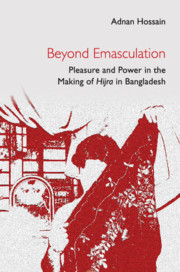Book contents
- Frontmatter
- Dedication
- Contents
- List of Figures
- Acknowledgements
- Introduction: Pleasure, Power and Masculinities
- 1 Kinship, Community and Hijragiri
- 2 Class-Cultural Politics and the Making of Hijras
- 3 Hijra Erotic Subjectivities: Pleasure, Practice and Power
- 4 The Paradox of Emasculation
- 5 Practices and Processes of Gendering
- 6 Love and Emotional Intimacy: Hijra Entanglement with Normative Bangla Men
- 7 Contemporary Transformation of Hijra Subjectivities
- Conclusion: Shifting Meaning and the Future of Hijras
- Glossary
- References
- Index
Introduction: Pleasure, Power and Masculinities
Published online by Cambridge University Press: 06 August 2021
- Frontmatter
- Dedication
- Contents
- List of Figures
- Acknowledgements
- Introduction: Pleasure, Power and Masculinities
- 1 Kinship, Community and Hijragiri
- 2 Class-Cultural Politics and the Making of Hijras
- 3 Hijra Erotic Subjectivities: Pleasure, Practice and Power
- 4 The Paradox of Emasculation
- 5 Practices and Processes of Gendering
- 6 Love and Emotional Intimacy: Hijra Entanglement with Normative Bangla Men
- 7 Contemporary Transformation of Hijra Subjectivities
- Conclusion: Shifting Meaning and the Future of Hijras
- Glossary
- References
- Index
Summary
In Bangladesh, as in many parts of South Asia, gangs of hijras adorned in saris and gaudy make-up are often seen swaggering down the busy streets, clapping and demanding alms at traffic lights or from the sellers in the bazaars. Like any typical Dhaka-dweller, I grew up viewing the hijras as not only starkly different from the normative mainstream, but also as neither men nor women. I have always been intrigued by the way people's attitude towards hijras tends to be a mixture of fear, pity and amusement. As popular public figures putatively devoid of functioning (male) genitals, and therefore occupying a liminal third space, hijras both arouse pity and incite laughter and mirth. At the same time, however, they are feared because they challenge mainstream society's notions of respectability and social protocols of appropriateness by engaging in activities ranging from sexually charged public cursing to exposing their putatively missing or defective genitals.
Upon close observation, one cannot help noticing the fact that hijras are perhaps the only group of people who are simultaneously asexual and hypersexual. Popular imagination across South Asia conflates genital ambiguity with asexuality or lack of sexual desire. Yet everyday interaction between hijras and ordinary people, especially men, is typically peppered with erotic banter, as hijras not only verbally shame the men with sexualized slurs, but also often directly fondle their genitals in a bid to coerce them into meeting their demands. The belligerence with which hijras typically communicate with the public (often accompanied by incessant hand clapping and body movements) is nothing short of being hyper-masculine in its aggressiveness and entitlement; at the same time, hijras emphasize their feminine comportment, which includes heavy make-up and nasalized speech, that enacts a caricature of femininity. Hijra practices thus raise the question of how to make sense of a social group that exemplifies values and practices that would seem to contradict each other.
This book focuses on these cultural paradoxes and contradictions in the production of the hijra subject position in Bangladesh and contends that hijra is an alternative space that one joins in order to be able to explore varied erotic, gender and sexual possibilities otherwise unavailable to normatively masculinized subjects both in Bangladesh and beyond.
- Type
- Chapter
- Information
- Beyond EmasculationPleasure and Power in the Making of <I>hijra</I> in Bangladesh, pp. 1 - 25Publisher: Cambridge University PressPrint publication year: 2021



